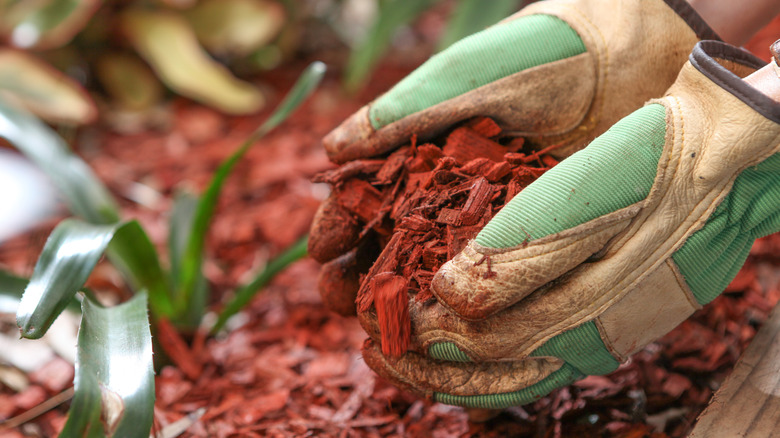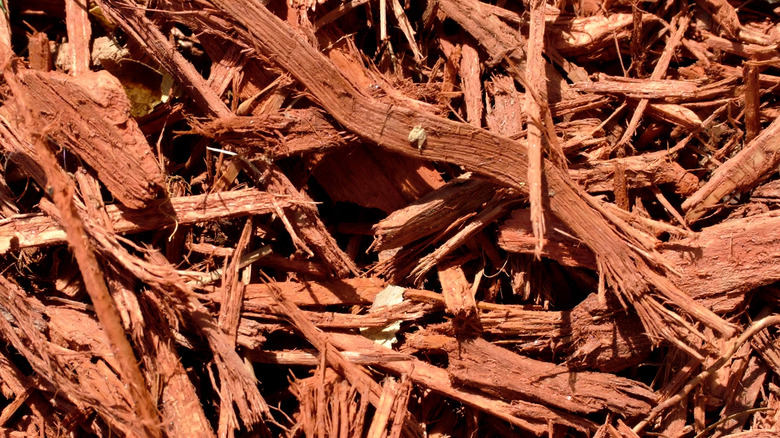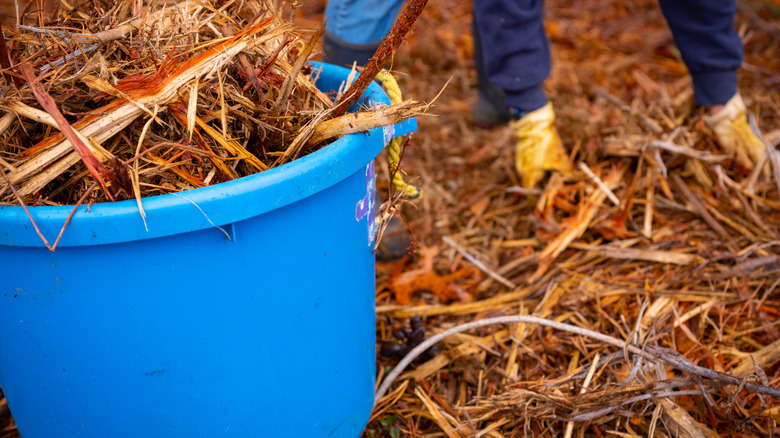The Best Type Of Mulch To Use If You Want To Keep Bugs Away
When choosing mulch for your flowerbeds and garden, you may be considering a variety of factors, including the way it looks and the cost of various types. With this said, one of the biggest considerations may be whether or not the mulch can help to ward off pests. In fact, selecting the right mulch could help to reduce the risk of pests infiltrating your garden space, helping to protect your plants from an infestation. The best mulch to use to repel insects and unwanted pests is cedar, though cypress mulch is a close second option.
You may know cedar is a very strong-smelling wood, one that can be a fantastic addition to a closet or a beautiful trunk at the end of your bed. However, cedar wood chips and mulch can be one of the best ways to add a pest fighter to your yard in perhaps one of the most natural ways possible. Since mulch is an organic material, a good source of nutrients for some pests, and a great way to hide from birds, many pests like to call it home. The strong scent of cedar mulch, however, works against them and deters them from taking up residence in your flowerbed.
Cypress is much the same. It also has a strong scent, which works as a natural deterrent for many insects. Using some cypress or cedar in each of your flowerbeds is typically all you need to do, and you can mix it with other woods in some environments.
When to use cypress and cedar mulch for pest control
Either cedar or cypress mulch is a good multipurpose mulching choice for most environments. As said, cedar's strong scent is typically one that people enjoy, but one that also can help with repelling a wide range of pests, including termites, cockroaches, and some beetles. It also does a good job of keeping away ants, and it may also help with slug and earwig infestations. If you have termites, on the other hand, you'll want to choose cypress heartwood mulch. Termites are able to eat other forms of cypress mulch, but heartwood can kill them.
These mulches can work in several ways. First, their scent is unattractive to these pests and will inhibit their reproduction. If you already have an infestation, using these wood mulches could work as a natural pesticide in that those pests who come in contact with it or ingest them will likely die from doing so. All of this is the result of the presence of thujone, a type of natural oil that works as a pest deterrent. Thujone, a type of essential oil, works as a convulsant and neurotoxin, which means it can kill pests quickly. Keep in mind that ingesting too much of it yourself can also lead to health risks in some people (so don't chew on the cedar and cypress mulch in your yard!).
Getting the best pest-deterrent results from cedar mulch
It's rather straightforward to place cedar or cypress mulch in your flowerbeds and garden. These types of mulch work well as a way to retain water, so be sure there's proper drainage present so that excessive water can drain away rather than keep the soil too wet. Either much is also a good option for its insulative qualities, which makes cedar or cypress mulch a solid choice for areas where you want the ground to stay warm.
Spreading an even layer of mulch about 3 inches thick around the surface of your plants is all it should take to prevent infestation. Choosing shredded mulch could be a better option for environments with more delicate flowers or smaller vegetables, while heavier and larger chips can be used around trees. These mulch types tend to take a long time to deteriorate, which means you can count on them working for months, if not years.
These mulches work best as a repellent, but adding more to an area where you already have a significant amount of pests could help to get rid of them. However, that process could take some time. In the meantime, you may want to use other types of natural protectants for your plants that may be under attack. This may include an insecticidal soap, cinnamon or garlic spray, or neem oil. These products may allow you to place them directly on the plants, making any bite from a pest poisonous or no longer attractive.


